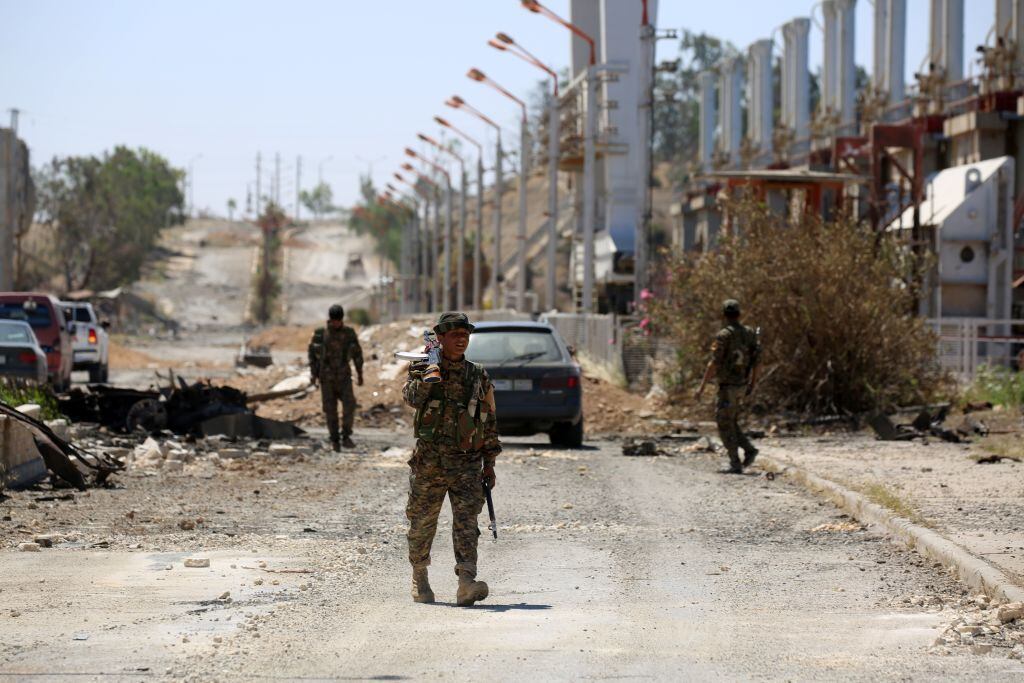WASHINGTON — U.S.-backed Syrian Democratic Forces are in a final push to completely encircle the city of Raqqa — ISIS' self-proclaimed capital, according to Col. Ryan Dillon, a spokesperson for Operation Inherent Resolve.
Bolstered by U.S. air support, the SDF — an alliance of Kurdish and Arab fighters — have made significant gains over the past several days and now "control all high speed avenues of approach into Raqqa," Dillon said.
Inside the city, Kurdish fighters have reached the northernmost part of the Rafiqa wall — an ancient wall surrounding the old city of Raqqa, built during the Abbasid Caliphate.
The rapid advancement of SDF fighters comes as Turkey has ramped up military operations in northern Syria, threatening the Kurdish-controlled district of Afrin, and potentially putting the Raqqa operation in jeopardy.
According to the Syrian Observatory for Human Rights and Kurdish activists, there has been shelling and attacks by both sides in and around the Aleppo countryside. Kurdish fighters with the People’s Protection Units, or YPG, believe Turkey is planning for an invasion of Afrin and Tel Rifaat, areas controlled by the YPG.
Turkish Deputy Prime Minister Veysi Kaynak appeared to confirm those fears Wednesday when he suggested to reporters at a news conference that Afrin needed to be cleared, according to a report by Hürriyet Daily News, a leading, English-language daily in Turkey. "In order to stabilize the region, the Afrin region needs to be cleared of terror elements and terrorists," he said.
U.S. officials in Baghdad contend there are no signs that YPG fighters within the SDF will abandon the Raqqa campaign to re-enforce areas under siege by Turkish and Turkish partner forces.
"Anything that takes their attention away," that concerns us, Dillon said. But those concerns are not just about the recent military maneuvers by Turkey, it also encompasses actions and troop movements of the Syrian regime and its proxy fighters, Dillon said.
For instance, a Syrian Su-22 bombed Kurdish positions just south of Tabqa dam a couple weeks ago, which provoked a U.S. response and the downing of the aircraft by a U.S. Navy F/A 18-Super Hornet. Since then, the coalition has established a deconfliction area with the Syrian regime south of Tabqa, which is still holding, according to Dillon.
Officials in Baghdad say they are unaware of any diplomatic overtures to the Turkish government concerning the military hostilities against the Kurds in northern Syria. However, Brett McGurk, the special presidential envoy for the global coalition against ISIS, recently visited Raqqa and talked with the Raqqa Civilian Council and toured the Tabqa dam. He was accompanied by Lt. Gen. Stephen J. Townsend, the U.S. commander in charge of Operation Inherent Resolve, and British Maj. Gen. Rupert Jones, the deputy commander.
U.S. officials have been vague about the purpose of the visits, and would not confirm whether the meetings had anything to do with the recent developments between Turkey and the YPG.
According to Dillon, the visits by Townsend and Jones were routine. Commanders "routinely move around to get updates" and they were just doing "battlefield circulation," he said.
The State Department described McGurk’s visit to Syria as routine as well. "Special Presidential Envoy Brett McGurk visits Iraq and Syria often to discuss humanitarian and stabilization assistance, and to coordinate between our military and civilian initiatives, as well as post-liberation governance for areas liberated from ISIS with our partners on the ground," said a spokesperson at the department.
In an interview with the Dubai-based Arabic news channel Al Aan TV while he was in Syria, McGurk acknowledged the U.S. has concerns about disruptions, but said that currently "everything in the Raqqa campaign is [going] according to plan."
The U.S. has spoken to the Turks about their military operations in Syria, McGurk said in the interview, "We continue to consult with the Turks weekly … we wouldn’t want anything to disrupt the Raqqa campaign," he said.
The coalition’s focus is now on Raqqa, but the next likely step after Raqqa’s liberation is the Euphrates River valley, where an estimated 5,000-10,000 ISIS fighters are entrenched.
Rumors have swirled that ISIS has established a new capital in the extensive stretch of terrain along the Euphrates, but Dillon said there is "no new hub." The last five high valued targets killed by the coalition were in the Mayadin area of the Euphrates valley, Dillon said.
With oil revenue down for the terror group, "ISIS is on the run, we will not allow them to catch up," he said.
Shawn Snow is the senior reporter for Marine Corps Times and a Marine Corps veteran.





